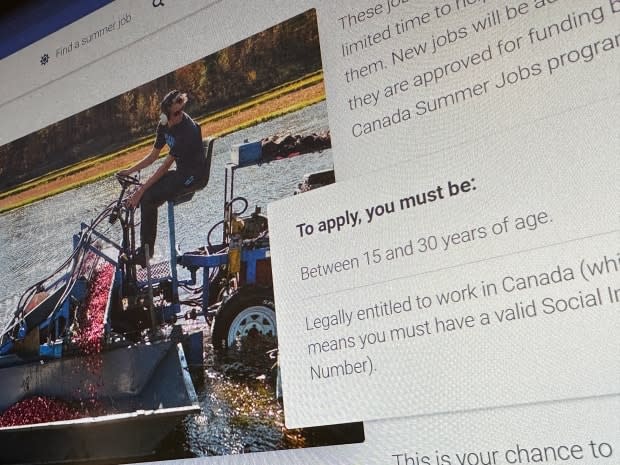Regina woman, 34, questions age criteria for federal subsidy after being passed over for jobs

Janette Harrison often feels dread and anxiety over how she'll afford life for herself and her toddler son.
Harrison, 34, said she returned to school to turn her life around. She recently finished her first year of the mental health and wellness program at the Saskatchewan Indian Institute of Technologies. Now, she's hunting for a summer job.
A few interested employers have called back, she said, but ultimately they had to hire someone else because of her age.
"I was totally shocked," Harrison told CBC News in her Regina home.
"They said [it's] because they're funded by the federal government and they've put [an age] cap on it."
The Canada Summer Jobs wage subsidy allows non-profit organizations, the public sector and private companies with no more than 50 full-time employees to create jobs for people aged 15 to 30.

The age range for the summer job subsidy was chosen because 15 is the minimum employment age for most provinces and territories, and the gap makes jobs accessible to more people, said Saskia Rodenburg, a spokesperson from the Ministry of Employment and Social Development.
The subsidy falls under the federal Youth Employment and Skills Strategy, which aims to help young Canadians — particularly those facing barriers, such as poverty, high-school dropouts and youth with disabilities, among others — enter the workforce and gain experience.
Many students end up filling jobs funded through the subsidy. But Rodenburg said targeting youth employment, instead of student employment, was an effort to make the job market more equitable for "youth furthest from opportunity and youth who face financial limitations with school."
The federal government is targeting youth employment overall because, historically, youth have higher unemployment rates than the general labour force, Rodenburg added.
About one in 20 Canadians were unemployed last fiscal year, Statistics Canada data shows.
Meanwhile, about 12.1 per cent of Canadian teenagers, aged 15 to 19, were unemployed last year — more than double that of the general labour force, data shows.
Canadians in their early 20s also experienced higher unemployment rates, averaging about 8.5 per cent last fiscal year, data shows. The unemployment rate for Canadians aged 25 to 29 nearly mimicked that of the general labour force.
Data shows unemployment rates in Saskatchewan are lower — and sometimes more volatile month-to-month, depending on the demographic — than Canada as a whole, but the same trends emerge.
Harrison had applied for jobs in line with her training, such as office administrative work and summer recreational planning for children.
Harrison, who co-parents her two-year-old son, budgeted how much income she would need to afford to attend post-secondary, including the summer months. But she's becoming desperate and she's considering applying for construction labourer jobs.

The anxiety wakes her at night, she said.
"I get this pit in my stomach," she said.
"I'm just panicked. I have to keep a roof over our heads, food in the fridge. Daycare is a huge thing for [my son's] social skills and his routine — and for my routine, for me to get things done throughout the day."
Harrison added that multiple classmates are also in the same boat, applying for jobs but finding their age disqualifies them.
Post-secondary students of all ages can gain paid work experience relevant to their field through the Student Work Placement Program, Rodenburg said.
Through the program, the ministry works with "employer delivery partners," a group of recognized associations and organizations that advocate for industry employers, according to the ministry's website.
Those partners work with businesses and post-secondary institutions to create placements, such as practicums and internships, the website says.


